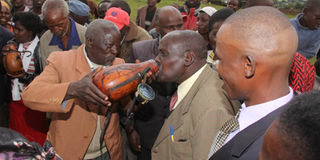Timboroa IDPs bury hatchet, slaughter goat to ‘exorcise chaos ghosts’

Elijah Langat gives mursik, the traditional Kalenjin sour milk to participants at a cleansing ceremony in Timboroa on Tuesday August 19, 2014. IDPs from different communities who were affected by the 2007/2008 post-election violence resolved to live in harmony. PHOTO | JARED NYATAYA | NATION MEDIA GROUP
What you need to know:
- During the ceremony held on Tuesday, they agreed to bury the hatchet and co-exist peacefully.
- The group also shared mursik, the traditional ceremonial Kalenjin sour milk.
Three communities living in Timboroa, an area which was badly affected by the 2007/2008 post-election violence on Tuesday agreed to bury the hatchet and co-exist peacefully.
They held a ceremony in which rituals were performed ‘to exorcise ghosts of the clashes.’
A group of Internally Displaced Persons (IDPs) drawn from the Kisii, Kalenjin and Kikuyu communities converged on Muchorwe Primary School in Timboroa Sub-County for the cleansing ceremony in which slaughtered a ritual goat.
The group also shared mursik, the traditional ceremonial Kalenjin sour milk.
Organisers of the cleansing ceremony, under the Internally Displaced Person Support Initiative (IDIPIS), said the goat was slaughtered to signify an end of the bloodshed witnessed during the 2007/2008 post-election violence.

Members of the internally Displaced Person Support Initiative (IDIPIS) share meat during the cleansing ceremony in Timboroa.
Timboroa, in Uasin Gishu County, was one of the worst hit areas during the two-month long violence which left over 1,300 people dead and hundreds of thousands displaced.
The chairman of the initiative, Mr Steven Mbugua, said the communities had decided to bury the hatchet and support the government of the day.

Mr Steven Mbugua, (in dark suit) said the communities had decided to bury the hatchet and support the government of the day.
“We have decided to come together as IDPs from all the communities that were affected by the post-election violence and have vowed to work together in support of the government,” said Mr Mbugua.
He reiterated that there was dire need for the Jubilee government to ensure that all the IDPs in the country were resettled and compensated.
Mr Francis Michira Ondieki, a representative of the Kisii community, called upon political leaders to tone down on their political pronouncements.

Goat meat is cut into pieces at Muchorwe Primary School in Timboroa in readiness fro the cleansing ceremony.
“There is need for our leaders to cross-check their political statements because some of them are the reason why chaos erupted after the disputed 2007 general elections,” said Mr Ondieki.
Mr Elijah Lang’at, a resident of Kondoo in Burnt Forest, called upon the communities to start engaging in intermarriages.
Mr Lang’at said this will greatly boost cohesion and integration between all the communities that were at loggerheads during the violence.

Paul Gitumo during the cleansing ceremony at Muchorwa in Timboroa on August 19, 2014.
“After all is said and done, we want to start seeing a situation where a Kalenjin gets married to a Kikuyu and vice versa so that we can boost peace, love and harmony amongst ourselves,” Mr Lang’at added.
Mrs Hellen Wanjiru advised the government to move around the country and see to it that all the IDPs and forest evictees who were compensated have fully settled.
“The government should ensure that all the IDPs in the country who were affected by the violence and later compensated are fully resettled and that they are leading normal lives just like any other Kenyans,” Mrs Wanjiru said.



